Rongju Ruan
and Other Contributors
Humanity's Last Code Exam: Can Advanced LLMs Conquer Human's Hardest Code Competition?
Jun 15, 2025Abstract:Code generation is a core capability of large language models (LLMs), yet mainstream benchmarks (e.g., APPs and LiveCodeBench) contain questions with medium-level difficulty and pose no challenge to advanced LLMs. To better reflected the advanced reasoning and code generation ability, We introduce Humanity's Last Code Exam (HLCE), comprising 235 most challenging problems from the International Collegiate Programming Contest (ICPC World Finals) and the International Olympiad in Informatics (IOI) spanning 2010 - 2024. As part of HLCE, we design a harmonized online-offline sandbox that guarantees fully reproducible evaluation. Through our comprehensive evaluation, we observe that even the strongest reasoning LLMs: o4-mini(high) and Gemini-2.5 Pro, achieve pass@1 rates of only 15.9% and 11.4%, respectively. Meanwhile, we propose a novel "self-recognition" task to measure LLMs' awareness of their own capabilities. Results indicate that LLMs' self-recognition abilities are not proportionally correlated with their code generation performance. Finally, our empirical validation of test-time scaling laws reveals that current advanced LLMs have substantial room for improvement on complex programming tasks. We expect HLCE to become a milestone challenge for code generation and to catalyze advances in high-performance reasoning and human-AI collaborative programming. Our code and dataset are also public available(https://github.com/Humanity-s-Last-Code-Exam/HLCE).
Pangu Light: Weight Re-Initialization for Pruning and Accelerating LLMs
May 26, 2025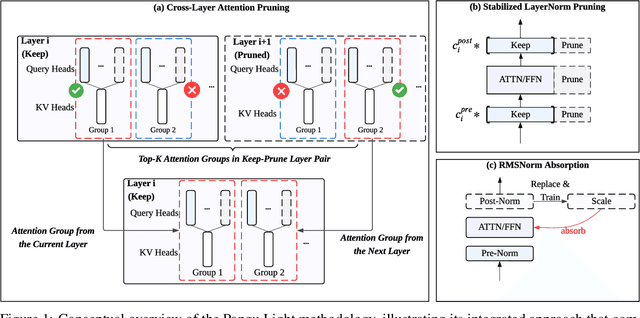

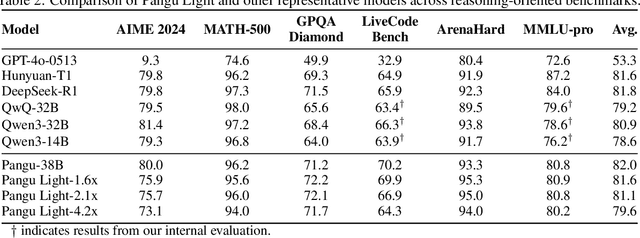
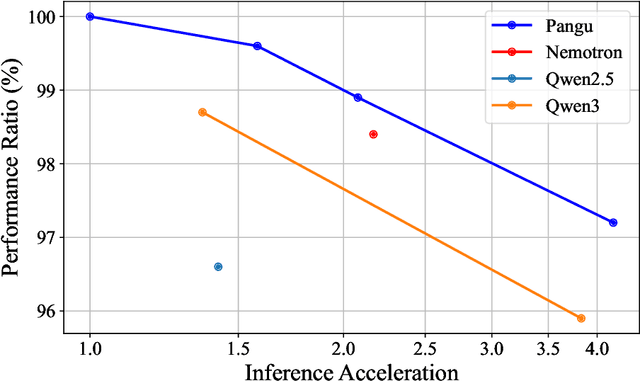
Abstract:Large Language Models (LLMs) deliver state-of-the-art capabilities across numerous tasks, but their immense size and inference costs pose significant computational challenges for practical deployment. While structured pruning offers a promising avenue for model compression, existing methods often struggle with the detrimental effects of aggressive, simultaneous width and depth reductions, leading to substantial performance degradation. This paper argues that a critical, often overlooked, aspect in making such aggressive joint pruning viable is the strategic re-initialization and adjustment of remaining weights to improve the model post-pruning training accuracies. We introduce Pangu Light, a framework for LLM acceleration centered around structured pruning coupled with novel weight re-initialization techniques designed to address this ``missing piece''. Our framework systematically targets multiple axes, including model width, depth, attention heads, and RMSNorm, with its effectiveness rooted in novel re-initialization methods like Cross-Layer Attention Pruning (CLAP) and Stabilized LayerNorm Pruning (SLNP) that mitigate performance drops by providing the network a better training starting point. Further enhancing efficiency, Pangu Light incorporates specialized optimizations such as absorbing Post-RMSNorm computations and tailors its strategies to Ascend NPU characteristics. The Pangu Light models consistently exhibit a superior accuracy-efficiency trade-off, outperforming prominent baseline pruning methods like Nemotron and established LLMs like Qwen3 series. For instance, on Ascend NPUs, Pangu Light-32B's 81.6 average score and 2585 tokens/s throughput exceed Qwen3-32B's 80.9 average score and 2225 tokens/s.
Pangu Ultra: Pushing the Limits of Dense Large Language Models on Ascend NPUs
Apr 10, 2025



Abstract:We present Pangu Ultra, a Large Language Model (LLM) with 135 billion parameters and dense Transformer modules trained on Ascend Neural Processing Units (NPUs). Although the field of LLM has been witnessing unprecedented advances in pushing the scale and capability of LLM in recent years, training such a large-scale model still involves significant optimization and system challenges. To stabilize the training process, we propose depth-scaled sandwich normalization, which effectively eliminates loss spikes during the training process of deep models. We pre-train our model on 13.2 trillion diverse and high-quality tokens and further enhance its reasoning capabilities during post-training. To perform such large-scale training efficiently, we utilize 8,192 Ascend NPUs with a series of system optimizations. Evaluations on multiple diverse benchmarks indicate that Pangu Ultra significantly advances the state-of-the-art capabilities of dense LLMs such as Llama 405B and Mistral Large 2, and even achieves competitive results with DeepSeek-R1, whose sparse model structure contains much more parameters. Our exploration demonstrates that Ascend NPUs are capable of efficiently and effectively training dense models with more than 100 billion parameters. Our model and system will be available for our commercial customers.
Cocktail: A Comprehensive Information Retrieval Benchmark with LLM-Generated Documents Integration
May 26, 2024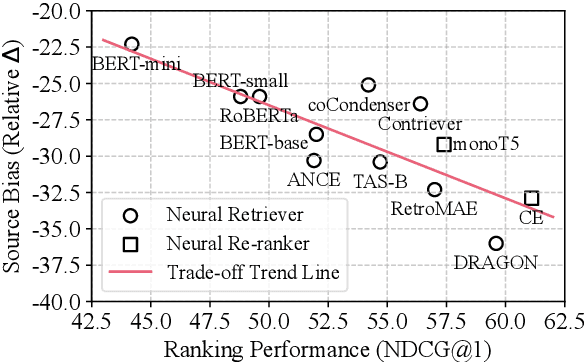
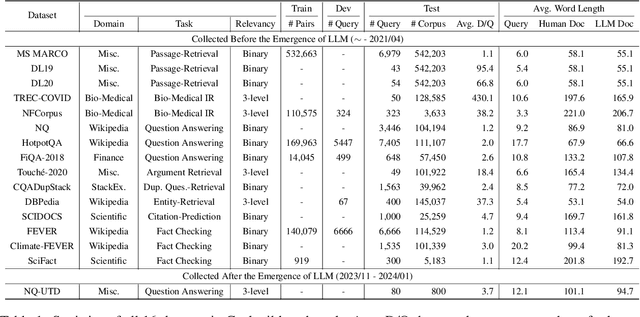

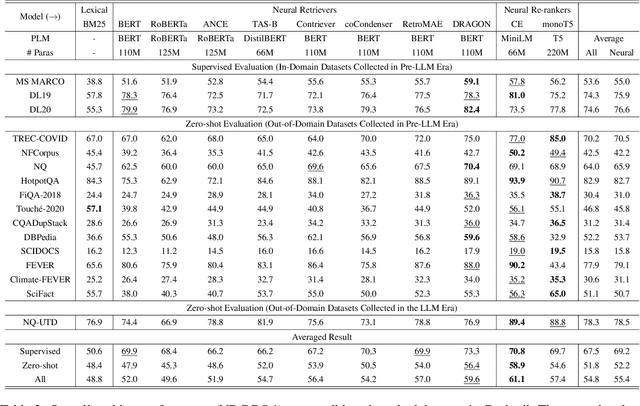
Abstract:The proliferation of Large Language Models (LLMs) has led to an influx of AI-generated content (AIGC) on the internet, transforming the corpus of Information Retrieval (IR) systems from solely human-written to a coexistence with LLM-generated content. The impact of this surge in AIGC on IR systems remains an open question, with the primary challenge being the lack of a dedicated benchmark for researchers. In this paper, we introduce Cocktail, a comprehensive benchmark tailored for evaluating IR models in this mixed-sourced data landscape of the LLM era. Cocktail consists of 16 diverse datasets with mixed human-written and LLM-generated corpora across various text retrieval tasks and domains. Additionally, to avoid the potential bias from previously included dataset information in LLMs, we also introduce an up-to-date dataset, named NQ-UTD, with queries derived from recent events. Through conducting over 1,000 experiments to assess state-of-the-art retrieval models against the benchmarked datasets in Cocktail, we uncover a clear trade-off between ranking performance and source bias in neural retrieval models, highlighting the necessity for a balanced approach in designing future IR systems. We hope Cocktail can serve as a foundational resource for IR research in the LLM era, with all data and code publicly available at \url{https://github.com/KID-22/Cocktail}.
MHPP: Exploring the Capabilities and Limitations of Language Models Beyond Basic Code Generation
May 19, 2024



Abstract:Recent advancements in large language models (LLMs) have greatly improved code generation, specifically at the function level. For instance, GPT-4 has achieved an 88.4% pass rate on HumanEval. However, this draws into question the adequacy of existing benchmarks in thoroughly assessing function-level code generation capabilities. Our study analyzed two common benchmarks, HumanEval and MBPP, and found that these might not thoroughly evaluate LLMs' code generation capacities due to limitations in quality, difficulty, and granularity. To resolve this, we introduce the Mostly Hard Python Problems (MHPP) dataset, consisting of 140 unique human-curated problems. By focusing on the combination of natural language and code reasoning, MHPP gauges LLMs' abilities to comprehend specifications and restrictions, engage in multi-step reasoning, and apply coding knowledge effectively. Initial evaluations of 22 LLMs using MHPP showed many high-performing models on HumanEval failed to achieve similar success on MHPP. Moreover, MHPP highlighted various previously undiscovered limitations within various LLMs, leading us to believe that it could pave the way for a better understanding of LLMs' capabilities and limitations. Dataset and code are available at https://github.com/SparksofAGI/MHPP.
 Add to Chrome
Add to Chrome Add to Firefox
Add to Firefox Add to Edge
Add to Edge